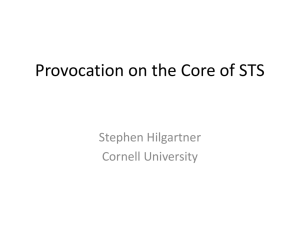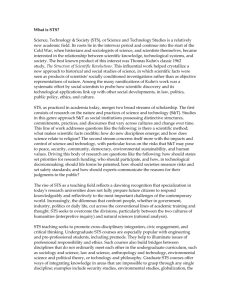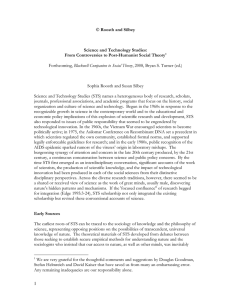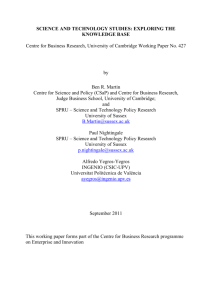Science and Technology Studies: A Philosophical - PAST
advertisement
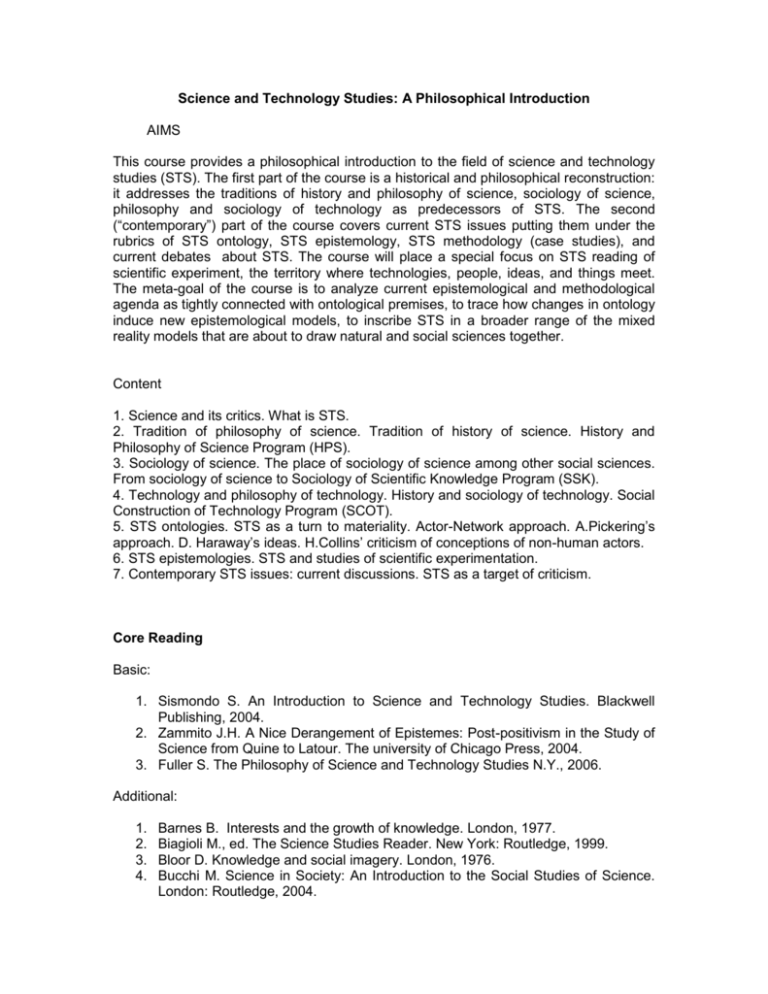
Science and Technology Studies: A Philosophical Introduction AIMS This course provides a philosophical introduction to the field of science and technology studies (STS). The first part of the course is a historical and philosophical reconstruction: it addresses the traditions of history and philosophy of science, sociology of science, philosophy and sociology of technology as predecessors of STS. The second (“contemporary”) part of the course covers current STS issues putting them under the rubrics of STS ontology, STS epistemology, STS methodology (case studies), and current debates about STS. The course will place a special focus on STS reading of scientific experiment, the territory where technologies, people, ideas, and things meet. The meta-goal of the course is to analyze current epistemological and methodological agenda as tightly connected with ontological premises, to trace how changes in ontology induce new epistemological models, to inscribe STS in a broader range of the mixed reality models that are about to draw natural and social sciences together. Content 1. Science and its critics. What is STS. 2. Tradition of philosophy of science. Tradition of history of science. History and Philosophy of Science Program (HPS). 3. Sociology of science. The place of sociology of science among other social sciences. From sociology of science to Sociology of Scientific Knowledge Program (SSK). 4. Technology and philosophy of technology. History and sociology of technology. Social Construction of Technology Program (SCOT). 5. STS ontologies. STS as a turn to materiality. Actor-Network approach. A.Pickering’s approach. D. Haraway’s ideas. H.Collins’ criticism of conceptions of non-human actors. 6. STS epistemologies. STS and studies of scientific experimentation. 7. Contemporary STS issues: current discussions. STS as a target of criticism. Core Reading Basic: 1. Sismondo S. An Introduction to Science and Technology Studies. Blackwell Publishing, 2004. 2. Zammito J.H. A Nice Derangement of Epistemes: Post-positivism in the Study of Science from Quine to Latour. The university of Chicago Press, 2004. 3. Fuller S. The Philosophy of Science and Technology Studies N.Y., 2006. Additional: 1. 2. 3. 4. Barnes В. Interests and the growth of knowledge. London, 1977. Biagioli M., ed. The Science Studies Reader. New York: Routledge, 1999. Bloor D. Knowledge and social imagery. London, 1976. Bucchi M. Science in Society: An Introduction to the Social Studies of Science. London: Routledge, 2004. 5. Collins H., Pinch T. Frames of meaning: The social construction of extraordinary science. London, 1981. 6. Collins H. Tacit and Explicit knowledge. University of Chicago Press, 2010. 7. Golinski J. Making Natural Knowledge: Constructivism and the History of Science, with a new Preface. University of Chicago Press, 2005. 8. Daston L. and P. Galison. Objectivity. Zone Books, 2007. 9. Delanda M. A New Philosophy of Society: Assemblage Theory And Social Complexity. Continuum, 2006. 10. Hacking I. The Social Construction of What? Harvard University Press, 1999. 11. Haraway D.Modest_Witness@Second_Millenium.Female_Man©_Meets_Oncomouse™: Feminism and Technoscience,. New York and London, 1997. 12. Haraway D. Situated Knowledges: The Science Question in Feminism and the Privilege of Partial Perspective // Simians, Cyborgs, and Women: The Reinvention of Nature. New York, 1991. 13. Harding S. Is science multicultural?: Postcolonialisms, feminisms, and epistemologies. Bloomington, 1998. 14. Hess D. Science Studies: An Advanced Introduction. New York: New York University Press, 1997. 15. Ihde D., Selinger, E. eds. Chasing technoscience: Matrix for Materiality. – Albany: SUNY University press, 2002 16. Irwin A., Wynne B. (eds) Misunderstanding Science?: The Public Reconstruction of Science and Technology. Cambridge, 2004. 17. Jasanoff S. etc, eds. Handbook of Science and Technology Studies. Sage Publications, 1995. 18. Knor-Cetina K. Epistemic Cultures: How sciences make knowledge. N.Y., 1999. 19. Labinger, J., Collins, H. The one culture? A conversation about science. Chicago, 2001. 20. Law J. and A.Mol, eds. Complexities: Social Studies of Knowledge Practices. Duke University Press, 2002. 21. Latour B. Pandora’s Hope: Essays on the reality of science studies. Cambridge, MA, 1999. 22. Latour B. Reassembling the social: An Introduction to Actor-Network-Theory. Oxford, 2005. 23. Latour B., Woolgar S. Laboratory Life: The social construction of scientific facts. Beverly Hills, 1979. 24. Mol, A. Ontological Politics: a Word and Some Questions // J. Law and J. Hassard (Eds.) Actor Network and After. Oxford and Keele, Blackwell and the Sociological Review. 1999. P. 74-89. 25. Pickering A. The Mangle of practice: Time, agency and science. Chicago: The University of Chicago Press, 1995 26. Pickering A. Constructing Quarks: A sociological history of particle physics. Edinburg, 1984. 27. Pickering A., ed. Science as practice and culture. Chicago, 1992. 28. Pinch T., Bijker W. The Social Construction of Facts and Artefacts: Or How the Sociology of Science and the Sociology of Technology Might Benefit Each Other // Social Studies of Science. 1984. № 14. P. 399-441. 29. Pinch T. Bijker W. Science, Relativism and the New Sociology of Technology: Reply to Russell // Social Studies of Science. 1986. № 16. P. 347-360. 30. Rouse, J. What are cultural studies of scientific knowledge? // Configurations. 1992. № 1 (1). P. 57-94. 31. Shapin S. The Scientific Life: A Moral History of a Late Modern Vocation. The University of Chicago Press. 2008. 32. Sismondo S. An Introduction to Science and Technology Studies. Oxford: Blackwell, 2003. 33. Yearley S. Making Sense of Science: Understanding the Social Study of Science. Sage Publications Ltd, 2004. 34. Winner L. Autonomous technology. MIT Press, 1977. 35. Winner L. Upon Opening the Black Box and Finding It Empty: Social Constructivism and the Philosophy of Technology // Science, Technology & Human Values 3/1993, p. 362-378. Online Databases: 1. Society for Social Studies of Science (4S). http://www.4sonline.org/ 2. European Association for the Study of Science and Technology (EASST). http://www.easst.net 3. Society for the History of Technology (SHOT). http://www.historyoftechnology.org/ 4. History of Science Society. http://www.hssonline.org/ 5. Science as Culture. http://human-nature.com/science-as-culture/ 6. The International Society for the History of Philosophy of Science (HOPOS). http://www.hopos.org/

